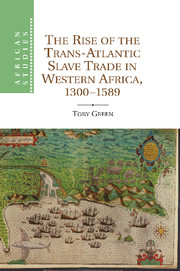Book contents
- Frontmatter
- Contents
- List of Maps
- Acknowledgements
- Abbreviations
- Glossary
- Introduction Rethinking the Trans-Atlantic Slave Trade from a Cultural Perspective
- Part One The Development Of An Atlantic Creole Culture In Western Africa, Circa 1300–1550
- 1 Culture, Trade and Diaspora in Pre-Atlantic Western Africa
- 2 The Formation of Early Atlantic Societies in Senegambia and Upper Guinea
- 3 The Settlement of Cabo Verde and Early Signs of Creolisation in Western Africa
- 4 The New Christian Diaspora in Cabo Verde and the Rise of a Creole Culture in Western Africa
- 5 The New Christian/Kassanké Alliance and the Consolidation of Creolisation
- Part Two Creolisation And Slavery
- Bibliography
- Index
2 - The Formation of Early Atlantic Societies in Senegambia and Upper Guinea
from Part One - The Development Of An Atlantic Creole Culture In Western Africa, Circa 1300–1550
Published online by Cambridge University Press: 05 November 2011
- Frontmatter
- Contents
- List of Maps
- Acknowledgements
- Abbreviations
- Glossary
- Introduction Rethinking the Trans-Atlantic Slave Trade from a Cultural Perspective
- Part One The Development Of An Atlantic Creole Culture In Western Africa, Circa 1300–1550
- 1 Culture, Trade and Diaspora in Pre-Atlantic Western Africa
- 2 The Formation of Early Atlantic Societies in Senegambia and Upper Guinea
- 3 The Settlement of Cabo Verde and Early Signs of Creolisation in Western Africa
- 4 The New Christian Diaspora in Cabo Verde and the Rise of a Creole Culture in Western Africa
- 5 The New Christian/Kassanké Alliance and the Consolidation of Creolisation
- Part Two Creolisation And Slavery
- Bibliography
- Index
Summary
Although the Atlantic world began in Western Africa, this important fact is rarely to be gleaned from most works of Atlantic history. Yet the Spanish settlement and conquest of the Canary Islands in the late fifteenth century only gathered pace as a direct response to Portuguese activity there. Almost thirty years separated the Portuguese arrival at the Senegal River in 1444 from their arrival at what became the Gold Coast (present-day Ghana) in 1471.
The birth of this Atlantic world in Western Africa was multifaceted. Primary creolisation in Upper Guinea and the process of state formation in medieval Portugal shaped an early Atlantic economy influenced profoundly by violence and its legacies. Yet on the other hand, these conditions had enabled a tradition of cultural sharing to develop in Western Africa. It was this combination of violence and flexibility which came to characterise Creole societies both here and elsewhere in the Atlantic world.
- Type
- Chapter
- Information
- Publisher: Cambridge University PressPrint publication year: 2011

